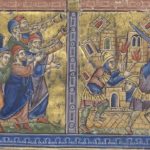We run our website the way we wished the whole internet worked: we provide high quality original content with no ads. We are funded solely by your direct support. Please consider supporting this project.

Sin-Bearing God
On the cross, God became our sin, as Paul wrote: “God made him who had no sin to be sin for us” (2 Cor 5:21). However, God didn’t begin to be a sin-bearing God when Jesus walked the earth and hung on the cross. Rather he became Incarnate and bore our sins on the cross because this is the kind of God he has always been. The Father is most “glorified” when the Son is crucified because the cross is the ultimate expression of the Father’s true character.
The OT actually foreshadows this cross-like love revealed by Christ—his other-oriented, self-emptying, and self-sacrificial sin-bearing nature—when the OT reveals how Yahweh often set aside his ideals to accommodate the sin and weakness of his people. For instance, in the case of the law, the OT theologian John Goldingay argues that Israelite law “starts where people are as sinners, and starts where they are in their cultural context.”[1] The same may be said about the fact that Yahweh’s covenantal commitment to his people throughout the OT was such that he was, to some extent, willing to leverage his own reputation on their behavior and welfare, for better or for worse. As Sheldon Blank notes regarding Isaiah 52:5, “God is disgraced because of the disgraceful condition of his people.”[2]
Daniel Block has made a solid case that this was the focus of the commandment to not “take the name of the LORD your God in vain” (Ex. 20:7, KJV).[3] It was an injunction for God’s people to not live in a way that brought dishonor to Yahweh.
This relational connectedness between Yahweh and his people which caused him to take on the sin of those people at the expense of his own reputation is also reflected in the way various authors frequently appeal to him to intervene or alter a plan for the sake of his reputation (e.g. Ex. 32:12; Num. 14:15-16). Moreover, throughout the OT narrative we find Yahweh allowing himself to experience profound pain at the hands of, and for the sake of, his rebellious people. And even when Yahweh felt he had no choice but to chastise his people, he did so reluctantly and often while expressing a grieving heart.
The cross constitutes the ultimate display of Yahweh’s “sin-bearing” character. It is the culmination of all prior, pen-ultimate expressions found in the OT. In Christ, Yahweh not only entered into, and was profoundly affected by, the limitations and sinfulness of humanity: in Christ, Yahweh became a limited human being, became our sin and became our judgment (Jn 1:14; 2 Cor 5:20). And in doing this, Jesus demonstrated that God didn’t begin to be the kind of God revealed on the cross, for if Jesus reveals who God truly is, he reveals who God has always been.
[1] E.g. J. Goldingay, Theological Diversity and the Authority of the Old Testament (Grand Rapids: Eerdmans, 1987), 154.
[2] S. Blank, “Isaiah 52.5 and the Profanation of the Name,” HUCA 25 (1954), 1-8 (6).
[3] D. I. Block, “No Other Gods: Bearing the Name of YHWH in a Polytheistic World,” in The Gospel according to Moses: Theological and Ethical Reflections on the Book of Deuteronomy (Eugene, OR: Cascade, 2012), 237-71.
Photo credit: Endre Majoros via Visualhunt / CC BY
Category: General
Tags: Cross, Cruciform Theology, Divine Accommodation
Topics: Attributes and Character
Related Reading

Reading the Bible “by Faith”
The cruciform approach to reading the Bible—and specifically the culturally-conditioned and sin-stained portraits of God—requires faith on the part of the reader, which I argue in Crucifixion of the Warrior God. On one level we can discern by faith that often times God broke through the limitations and sin of the ancient authors, for we…

Does the Lord “Devastate” the Earth?
There is this passage that has sometimes been labeled “Isaiah’s Little Apocalypse” that proclaims how the Lord will “lay waste,” “destroy,” and “ruin” the earth. (The following builds on this previous post which identifies a dual speech pattern of God). It begins with: The LORD is going to lay waste the earth and devastate…

Podcast: How Do You Teach a Cruciform Hermeneutic from the Pulpit?
Greg talks about infallibility and inerrancy. http://traffic.libsyn.com/askgregboyd/Episode_0281.mp3

Overview of Crucifixion of the Warrior God
Greg reviewed the content of his new book, Crucifixion of the Warrior God, as a part of the Woodland Hills Church Covenant Partner gathering on March 5, 2017. If you want a fairly succinct synopsis of the thesis of his book, look no further. Ten years ago, Greg set out to write a book justifying the…

The Most Quoted Old Testament Verse
No other passage from the Old Testament is quoted more by New Testament authors than Psalm 110:1. Its frequent citation should cause us to pay attention to what is being said. It reads: The Lord says to my lord, “Sit at my right hand until I make your enemies your footstool.” In David’s day, it…

Do We Read Bible-Violence to Children? (podcast)
Greg on children and Bible violence. Episode 658 http://traffic.libsyn.com/askgregboyd/Episode_0658.mp3
